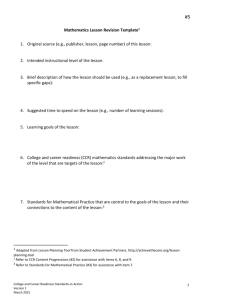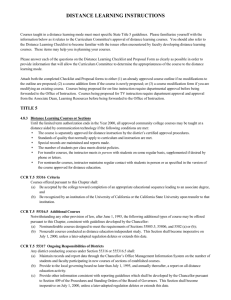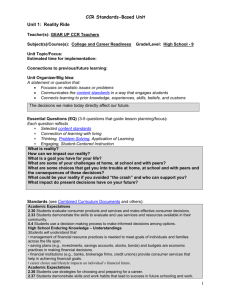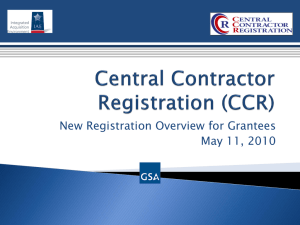Element 5A GE Goals & SLOS. Revised 2015
advertisement
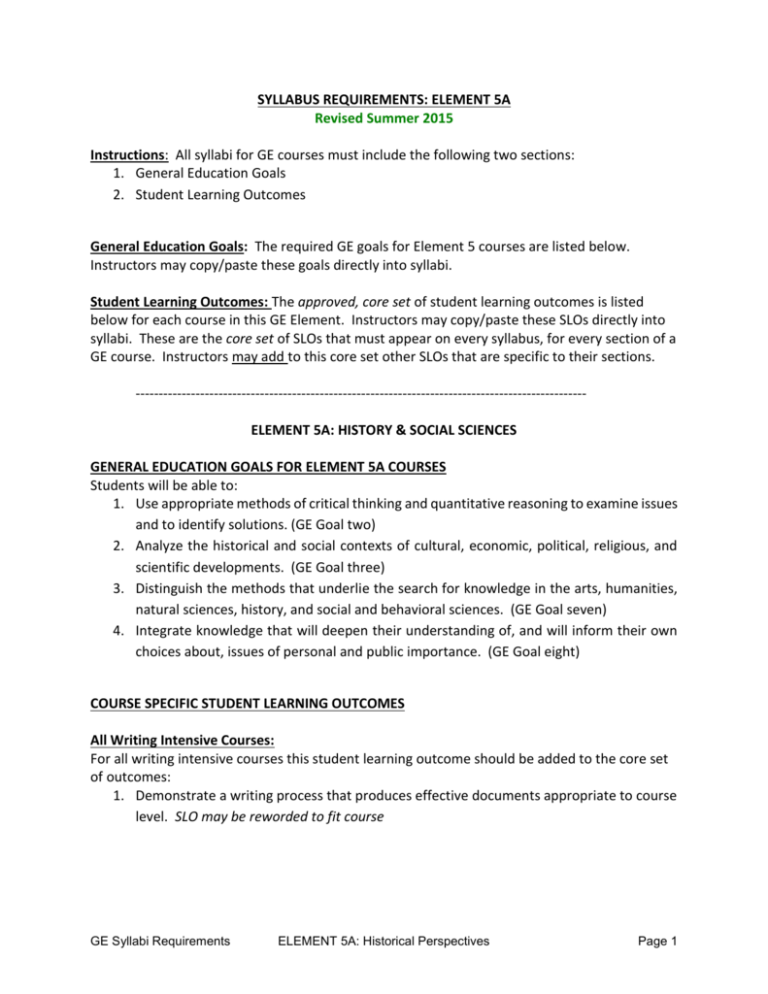
SYLLABUS REQUIREMENTS: ELEMENT 5A Revised Summer 2015 Instructions: All syllabi for GE courses must include the following two sections: 1. General Education Goals 2. Student Learning Outcomes General Education Goals: The required GE goals for Element 5 courses are listed below. Instructors may copy/paste these goals directly into syllabi. Student Learning Outcomes: The approved, core set of student learning outcomes is listed below for each course in this GE Element. Instructors may copy/paste these SLOs directly into syllabi. These are the core set of SLOs that must appear on every syllabus, for every section of a GE course. Instructors may add to this core set other SLOs that are specific to their sections. -------------------------------------------------------------------------------------------------ELEMENT 5A: HISTORY & SOCIAL SCIENCES GENERAL EDUCATION GOALS FOR ELEMENT 5A COURSES Students will be able to: 1. Use appropriate methods of critical thinking and quantitative reasoning to examine issues and to identify solutions. (GE Goal two) 2. Analyze the historical and social contexts of cultural, economic, political, religious, and scientific developments. (GE Goal three) 3. Distinguish the methods that underlie the search for knowledge in the arts, humanities, natural sciences, history, and social and behavioral sciences. (GE Goal seven) 4. Integrate knowledge that will deepen their understanding of, and will inform their own choices about, issues of personal and public importance. (GE Goal eight) COURSE SPECIFIC STUDENT LEARNING OUTCOMES All Writing Intensive Courses: For all writing intensive courses this student learning outcome should be added to the core set of outcomes: 1. Demonstrate a writing process that produces effective documents appropriate to course level. SLO may be reworded to fit course GE Syllabi Requirements ELEMENT 5A: Historical Perspectives Page 1 5A: HISTORY ANT 200: Anthropology of Human Society At the end of this course, you will be able to… 1. Comprehend and navigate the economic, social, political and religious variables for human societies along the anthropologists’ timeline. 2. Describe the methods anthropologists employ to understand human societies. 3. Integrate concepts associated with change in human societies along the anthropologists’ timeline. 4. Use ethnographic examples to demonstrate understanding of the broad sweep of human societal change. 5. Analyze and evaluate the condition of nonindustrial societies in the contemporary era, relative to their existence in the ethnographic present. HIS 100: World Topics to 1500: War in the Ancient World (Passed GE 10.23.14) Upon completion of this course, students should be able to: 1. Comprehend selected major developments in history. 2. Analyze the causes and effects of historical change with respect to the selected major historical developments under consideration in this course. 3. Evaluate primary sources as historical evidence, developing effective historical arguments on the basis of documentary analysis. 4. Demonstrate an understanding of the significance of primary source evidence as the basis of effective historical analysis and understanding. 5. Demonstrate an integrated understanding of the interaction of political, social, cultural, economic, technological and/or religious factors as causes and expressions of historical change. HIS 101: WORLD TOPICS SINCE 1500 (Passed GE 10.23.14) Upon successful completion of this course, the student should be able to: 1. Comprehend selected major developments in history. 2. Analyze the causes and effects of historical change with respect to the selected major historical developments under consideration in this course. 3. Evaluate primary sources as historical evidence, developing effective historical arguments on the basis of documentary analysis. 4. Demonstrate an understanding of the significance of primary source evidence as the basis of effective historical analysis and understanding. GE Syllabi Requirements ELEMENT 5A: Historical Perspectives Page 2 5. Demonstrate an integrated understanding of the interaction of political, social, cultural, economic, technological and/or religious factors as causes and expressions of historical change. History 102:American Civilization to 1877 (Passed GE 10.23.14) Upon completion of this course, student will be able to: 1. Comprehend selected major developments in United States History to 1877. 2. Analyze the causes and effects of historical change with respect to the selected major developments in U.S. History under consideration in this course. 3. Evaluate primary sources as historical evidence, developing effective historical arguments on the basis of documentary analysis. 4. Demonstrate an understanding of the significance of primary source evidence as the basis of effective historical analysis and understanding. 5. Demonstrate an integrated understanding of the interaction of political, social, cultural, economic, technological and/or religious factors as causes and expressions of historical change. HIS 103 – American Civilization since 1877 (Passed GE 10.23.14) Upon completion of this course, students will be able to: 1. Comprehend selected major developments in US History since 1877. 2. Analyze the causes and effects of historical change with respect to the selected major developments in U.S. History under consideration in this course. 3. Evaluate primary sources as historical evidence, developing effective historical arguments on the basis of documentary analysis. 4. Demonstrate an understanding of the significance of primary source evidence as the basis of effective historical analysis and understanding. 5. Demonstrate an integrated understanding of the interaction of political, social, cultural, economic, technological and/or religious factors as causes and expressions of historical change. HIS 147: World Civilizations Since 1500 (Passed GE 10.23.14) Students will be able to: 1. Use appropriate methods of critical thinking and quantitative reasoning to examine issues and to identify solutions (GE Goal 2) 2. Analyze the historical and social contexts of cultural, economic, political, religious, and scientific developments (GE Goal 3) 3. Distinguish the methods that underlie the search for knowledge in the arts, humanities, social sciences, history, and social or behavioral sciences (GE Goal 7) GE Syllabi Requirements ELEMENT 5A: Historical Perspectives Page 3 4. Integrate knowledge that will deepen their understanding of, and will inform their own choices about, issues of personal and public importance (GE Goal 8) HIS 202: American Civilization to 1877 Dropped GE 10.23.14 Upon completion of this course, students will be able to: 1. Comprehend selected major developments in United States History to 1877 2. Analyze the causes and effects of historical change with respect to the selected major developments in U.S. History under consideration in this course. 3. Evaluate primary sources as historical evidence, developing effective historical arguments on the basis of documentary analysis. 4. Demonstrate an understanding of the significance of primary source evidence as the basis of effective historical analysis and understanding. 5. Demonstrate an integrated understanding of the interaction of political, social, cultural, economic, technological and/or religious factors as causes and expressions of historical change. HIS 203: American Civilization since 1877 Dropped GE 10.23.14 Upon completion of this course, students will be able to: 1. Comprehend selected major developments in United States History since 1877. 2. Analyze the causes and effects of historical change with respect to the selected major developments in U.S. History under consideration in this course. 3. Evaluate primary sources as historical evidence, developing effective historical arguments on the basis of documentary analysis. 4. Demonstrate an understanding of the significance of primary source evidence as the basis of effective historical analysis and understanding. 5. Demonstrate an integrated understanding of the interaction of political, social, cultural, economic, technological and/or religious factors as causes and expressions of historical change. History 204W: Historical Inquiry Upon completion of this course, students will be able to: 1. Comprehend selected major developments in history. 2. Analyze the causes and effects of historical change with respect to the selected major historical developments under consideration in this course. 3. Evaluate primary sources as historical evidence, developing effective historical arguments on the basis of documentary analysis. GE Syllabi Requirements ELEMENT 5A: Historical Perspectives Page 4 4. Demonstrate an understanding of the significance of primary source evidence as the basis of effective historical analysis and understanding. 5. Demonstrate an integrated understanding of the interaction of political, social, cultural, economic, technological and/or religious factors as causes and expressions of historical change. 6. Students will demonstrate a writing process that produces effective documents appropriate to course level. 7. Students will recognize effective writing strategies. HIS 231: Western Civilization to 1687 Dropped GE 10.23.14 Upon completion of this course, students will be able to: 1. Comprehend selected major developments in Western Civilization to 1687 C.E. 2. Analyze the causes and effects of historical change with respect to the selected major developments in Western Civilization under consideration in this course. 3. Evaluate primary sources as historical evidence, developing effective historical arguments on the basis of documentary analysis. 4. Demonstrate an understanding of the significance of primary source evidence as the basis of effective historical analysis and understanding. 5. Demonstrate an integrated understanding of the interaction of political, social, cultural, economic, technological and/or religious factors as causes and expressions of historical change. HIS 232: Western Civilization since 1687 Dropped GE 10.23.14 Upon completion of this course, students will be able to: 1. Comprehend selected major developments in Western Civilization since 1687 C.E. 2. Analyze the causes and effects of historical change with respect to the selected major developments in Western Civilization under consideration in this course. 3. Evaluate primary sources as historical evidence, developing effective historical arguments on the basis of documentary analysis. 4. Demonstrate an understanding of the significance of primary source evidence as the basis of effective historical analysis and understanding. 5. Demonstrate an integrated understanding of the interaction of political, social, cultural, economic, technological and/or religious factors as causes and expressions of historical change. HIS 246: World Civilization I Dropped GE 10.23.14 Upon completion of this course, students will be able to: GE Syllabi Requirements ELEMENT 5A: Historical Perspectives Page 5 1. Comprehend selected major developments in World History to 1500 C.E. 2. Analyze the causes and effects of historical change with respect to the selected major developments in World History under consideration in this course. 3. Evaluate primary sources as historical evidence, developing effective historical arguments on the basis of documentary analysis. 4. Demonstrate an understanding of the significance of primary source evidence as the basis of effective historical analysis and understanding. 5. Demonstrate an integrated understanding of the interaction of political, social, cultural, economic, technological and/or religious factors as causes and expressions of historical change. HIS 247: World Civilization II Dropped GE 10.23.14 Upon completion of this course, students will be able to: 1. Comprehend selected major developments in World History since 1500 C.E. 2. Analyze the causes and effects of historical change with respect to the selected major developments in World History under consideration in this course. 3. Evaluate primary sources as historical evidence, developing effective historical arguments on the basis of documentary analysis. 4. Demonstrate an understanding of the significance of primary source evidence as the basis of effective historical analysis and understanding. 5. Demonstrate an integrated understanding of the interaction of political, social, cultural, economic, technological and/or religious factors as causes and expressions of historical change. MSL 303 – American Military History Upon completion of this course, students will be able to: 1. Comprehend and communicate orally and in written form selected major development in United States Military History since 1775. 2. Analyze orally and in written form the causes and effects of historical change with respect to the selected major developments in U.S. Military History under consideration in this course. 3. Evaluate through discussion, exam, or argumentative essay formats primary sources as historical military evidence, developing effective historical arguments on the basis of documentary evidence. 4. Demonstrate through discussion, exam or argumentative essay formats an understanding of the significance of primary source evidence as the basis of effective military historical analysis and understanding. GE Syllabi Requirements ELEMENT 5A: Historical Perspectives Page 6 5. Demonstrate through discussion, exam, or argumentative essay formats an integrated understanding of the interaction of political, social, cultural, economic, technological and/or religious factors as causes and expressions of military historical change. POL 101: Introduction to American Government Students will study American government using political concepts, which provide a formal framework for public policy, political behavior and government actions and institutions. Students successfully completing this course will be able to: 1. Demonstrate comprehension of the basic institutions and processes of American politics through written and oral communication. (CCR.R.1; CCR.R.2; CCR.W.2) 2. Demonstrate comprehension of the role of citizens in our democracy and evaluate their own roles in the political process through written and oral communication. (CCR.R.1; CCR.R.2; CCR.W.2) 3. Apply, orally and in writing, concepts in American government to examples drawn from their everyday lives. (CCR.W.2) 4. Analyze orally and in written form current political events, integrate information about disparate events, and evaluate their own positions. (CCR.R.1; CCR.R.2; CCR.R.7; CCR.R.8; CCR.W.1; CCR.W.2; CCR.W.9) 5. Identify, comprehend and communicate orally and in written form selected major political developments in United States history. (CCR.R 1, 2, 7, 9, 10; CCR.W 2, 9) 6. Analyze orally and in written form the ways in which contemporary American politics have been influenced by historical developments. (CCR.R 3, 7, 9, 10; CCR.W 1, 2, 4, 9) 7. Evaluate primary sources as evidence for political scientists through written and oral communication. (CCR.R 1, 2, 3, 4, 6, 7, 8, 9, 10; CCR.W 1, 2, 4, 9) 8. Demonstrate comprehension of the forms of political participation and measure the effects of participation by various groups through written and oral communication. (CCR.R.1; CCR.R.2; CCR.W.2; CCR.W.9) 9. Explain orally and in writing the effects of social, economic, cultural, geographic and psychological factors on political ideology and political preferences. (CCR.R.1; CCR.R.2; CCR.W.1; CCR.W.2) 10. Analyze orally and in written form political arguments and integrate new information in relation to those arguments. (CCR.R.1; CCR.R.2; CCR.R.3; CCR.R.4; CCR.R.9; CCR.W.1; CCR.W.2; CCR.W.9) 11. Analyze and evaluate orally and in written form the impact of political choices and policies upon themselves and upon society as a whole. (CCR.R.3; CCR.W.1; CCR.W.2; CCR.W.9) GE Syllabi Requirements ELEMENT 5A: Historical Perspectives Page 7 POL 212: Introduction to Comparative Politics After you have successfully completed the work required in POL 212, you will be able to: 1. Comprehend important concepts and terminology in the study of comparative politics. 2. Apply theoretical concepts in the analysis of political systems. 3. Explain basic institutions and processes found in differing political systems and analyze the likely impact and trade-offs of the institutional and process choices made by different countries. 4. Explain and trace how choices concerning contemporary political systems in selected countries developed through historical evolutionary and revolutionary change in those countries and in the global environment. 5. Demonstrate an understanding of the methods used in comparative politics. 6. Integrate information about institutions and processes with information about the historical-cultural, socio-economic, and/or international environments in which governments operate and draw meaningful comparisons among countries. 7. Demonstrate an ability to use critical thinking skills in the analysis of primary source material from selected countries. GE Syllabi Requirements ELEMENT 5A: Historical Perspectives Page 8

